

The elderly are predominantly vulnerable to social isolation because of aging-related role transitions (e.g., retirement, caregiving, loss of family/friends), physical changes (e.g., changes in health status, mobility, sensory function), and societal views (e.g., ageism).
However, interventions and actions aimed at alleviating social isolation have received widespread support to address this growing problem.
As most elderly have families that are providing some level of care and support, therefore, as family caregivers, paid caregivers, or professional caregivers, you continue to play a significant role in providing care to the elderly.
Learn more about what can you do as a caregiver to help your loved ones or care recipients deal with social isolation.
The definition of social isolation.
What is social isolation? Written by: No Isolation Last updated: June 5, 2020 Social isolation is a term often used interchangeably with loneliness, but while the two are closely related, they do not necessarily mean the same thing.
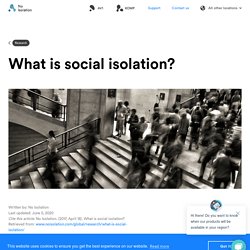
You can be lonely in a crowd, but you will not be socially isolated. Isolation has been defined as an objective state whereby the number of contacts a person has can be counted, whereas loneliness is a subjective experience. While the terms may have slightly different meanings, both can be painful experiences and have a harmful impact on the individual. Understanding social isolation. Social isolation and loneliness.
Social isolation versus loneliness. Social Isolation VS. Loneliness, They are not the same. Isolation and Loneliness: What’s the Difference? Some people use the words “isolation” and “loneliness” interchangeably, but this does not reflect the true meaning of each term.
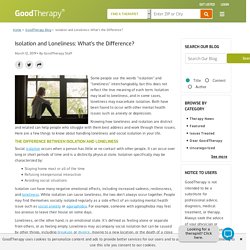
Isolation may lead to loneliness, and in some cases, loneliness may exacerbate isolation. Both have been found to occur with other mental health issues such as anxiety or depression. Knowing how loneliness and isolation are distinct and related can help people who struggle with them best address and work through these issues. Summary of the article and videos on the differences between social isolation and loneliness. Summary of articles that indicates elderly's vulnerability to social isolation and the main factors that cause social isolation and loneliness. Causes of Social Isolation in Elderly Adults. No one likes to feel lonely or isolated, but for many seniors, it’s a feeling they know all too well.
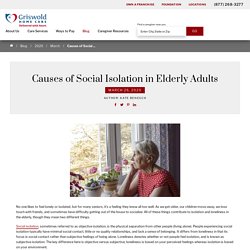
As we get older, our children move away, we lose touch with friends, and sometimes have difficulty getting out of the house to socialize. All of these things contribute to isolation and loneliness in the elderly, though they mean two different things. Social isolation, sometimes referred to as objective isolation, is the physical separation from other people (living alone). People experiencing social isolation typically have minimal social contact, little or no quality relationships, and lack a sense of belonging. It differs from loneliness in that its focus is social contact rather than subjective feelings of being alone. People are considered to be isolated if they live alone, never go out of the house, have no close relatives, never visit anyone, have no contact with neighbors, have no phone, or are alone for more than 9 hours a day.
7 factors that could lead to social isolation. Winter can be an especially solitary time for some seniors, who may find they are spending more time alone in their homes because of bad weather or lack of transportation.

Canadian research shows that isolation isn’t just confined to the winter months for older adults: a recent federal government profile of social isolation estimated that 30 per cent of seniors are at risk of becoming socially isolated.* A report from the International Federation of Ageing also identified social isolation as one of the top issues facing Canada’s aging population.* What does it mean to be socially isolated? Unexpected Causes of Senior Isolation. While seniors have lived full and fulfilling lives, they may experience loneliness and isolation as they get older.
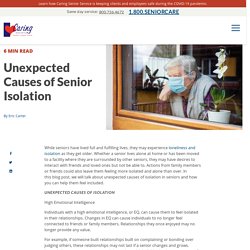
Whether a senior lives alone at home or has been moved to a facility where they are surrounded by other seniors, they may have desires to interact with friends and loved ones but not be able to. Actions from family members or friends could also leave them feeling more isolated and alone than over. Social Isolation and Loneliness in Older Adults: Opportunities for the Health Care System.
At the status of at-risk populations in other countries (e.g., Steptoe et al., 2013; Zebhauser et al., 2014), studies focusing on at-risk subpopulations in the United States are sparse.
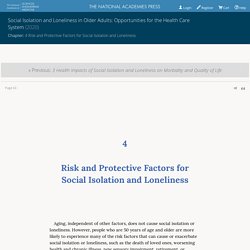
Two populations in the United States that have been researched more extensively than others are immigrants and individuals who identify as part of the gay, lesbian, bisexual, and transgender community. Research pertaining to these two groups is described below. Immigrants. Potential Causes of Isolation. The negative impact of social isolation on physical and mental health of the elderly. Putative mechanisms by which social connections influence morbidity and mortality. The effects of isolation on the physical and mental health of older adults. With the world in the grip of the covid-19 pandemic, unprecedented restrictions have been placed on social freedoms.
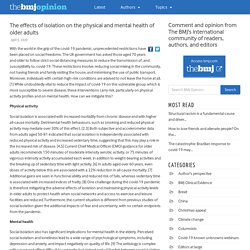
The UK government has asked those aged 70 years and older to follow strict social distancing measures to reduce the transmission of, and susceptibility to, covid-19. These restrictions involve: reducing social mixing in the community, not having friends and family visiting the house, and minimising the use of public transport. Moreover, individuals with certain high-risk conditions are advised to not leave the home at all. [1] While undoubtedly vital to reduce the impact of covid-19 on this vulnerable group, which is more susceptible to severe disease, these interventions carry risk, particularly on physical activity profiles and on mental health. How can we mitigate this? Social isolation can harm the health of the elderly like smoking or obesity. Loneliness & Isolation.
Social Isolation Leads to Depression for Seniors. As people age, they may become isolated; and that isolation can lead to depression, according to a recent post from the Straits Times.
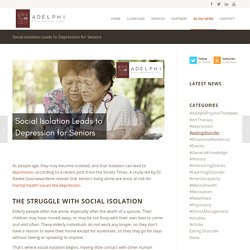
A study led by Dr. Nadee Goonawardene reveals that seniors living alone are most at risk for mental health issues like depression. The Struggle with Social Isolation Elderly people often live alone, especially after the death of a spouse. Their children may have moved away, or may be too busy with their own lives to come and visit often. That’s where social isolation begins. Seniors often struggle with physical ailments that make it difficult to get out and walk, go shopping, or catch the train to visit a friend.
The 2016 Study of Isolated Seniors. Social Isolation is Bad for the Mental Health of Older Adults. Social integration and having positive social relationships are important for our health and well-being, especially in old age.
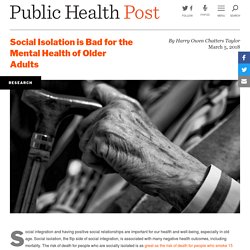
Social isolation, the flip side of social integration, is associated with many negative health outcomes, including mortality. The risk of death for people who are socially isolated is as great as the risk of death for people who smoke 15 cigarettes a day. As such, many prominent national and international organizations have now called for a greater understanding of social isolation and how to mitigate its deadly effects. These include the World Health Organization, the National Academy of Medicine, the AARP Foundation, and the American Academy of Social Work and Social Welfare’s Grand Challenges of Social Work.
Loneliness and Social Isolation Linked to Serious Health Conditions. Social isolation was associated with about a 50% increased risk of dementia and other serious medical conditions.
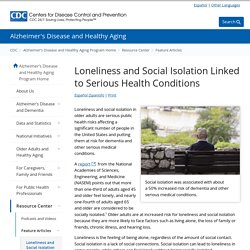
Loneliness and social isolation in older adults are serious public health risks affecting a significant number of people in the United States and putting them at risk for dementia and other serious medical conditions. A new reportexternal icon from the National Academies of Sciences, Engineering, and Medicine (NASEM) points out that more than one-third of adults aged 45 and older feel lonely, and nearly one-fourth of adults aged 65 and older are considered to be socially isolated.1 Older adults are at increased risk for loneliness and social isolation because they are more likely to face factors such as living alone, the loss of family or friends, chronic illness, and hearing loss. Loneliness is the feeling being alone, regardless of the amount of social contact.
The cognitive development of the elderly. How Social Isolation Affects the Brain. Daisy Fancourt was at her home in Surrey in southeast England when the UK government formally announced a nationwide lockdown. Speaking in a televised address on March 23, UK Prime Minister Boris Johnson laid out a suite of measures designed to curb the spread of COVID-19, including closing public spaces and requiring people to stay home except for exercise and essential tasks. For Fancourt, an epidemiologist at University College London (UCL), the announcement meant more than just a change to her daily life.
It was the starting gun for a huge study, weeks in the planning, that would investigate the effects of enforced isolation and other pandemic-associated changes on the British public. The Isolated Brain. Older adults who are socially isolated tend to perform worse on tests of thinking abilities.
Physical pain is unpleasant, yet it’s vital for survival because it’s a warning that your body is in danger. It tells you to take your hand off a hot burner or to see a doctor about discomfort in your chest. Pain reminds us all that we need to take care of ourselves. Feeling lonely is the social equivalent to feeling physical pain. It even triggers the same pathways in the brain that are involved in processing emotional responses to physical pain. Just like feeling physical pain, feeling lonely and disconnected from others is also a signal that we need to take care of ourselves by seeking the safety and comfort of companionship. Social Isolation and Memory Decline in Later-life. Skip to Main Content Advertisement Search. Social isolation impacts late-life socio-cognitive decline in APP/PS1 mice.
Promoting cognitive health in older adults. We recently published an evidence-based resource to support local authorities, commissioners and providers to promote cognitive health in older adults aged 55 and above. This is an important issue because, whilst the fact that people are living longer lives is a public health success story, we know that many of these extra years are spent in ill health or disability. The next challenge for the health and social care sector is to support individuals to prevent ill health in later years and increase healthy life expectancy, so it's crucial that older adults are supported to maintain and improve their physical, mental and social health and wellbeing. An alarming proportion of mid-life and older adults are physically inactive, smoke, misuse alcohol, have poor eating patterns and are socially isolated, putting them at risk of substantially increased mortality and ill health.
The resource is based on three systematic reviews conducted by the Cambridge Institute of Public Health (CIPH). Cognitive Development in Late Adulthood - PSY 180 - Psychology of Aging - Textbook - LibGuides at Hostos Community College Library. Cognitive Development in Late Adulthood There are numerous stereotypes regarding older adults as being forgetful and confused, but what does the research on memory and cognition in late adulthood actually reveal?
In this section, we will focus upon the impact of aging on memory, how age impacts cognitive functioning, and abnormal memory loss due to Alzheimer’s disease, delirium, and dementia. Socially excluded elderly are more likely to suffer cognitive impairment. Social isolation are one of the most affected health outcomes during the COVID-19 outbreak. COVID-19: Ensuring the elderly don't become isolated during the outbreak. SINGAPORE: Organisations that provide care and support for the elderly are stepping up outreach efforts to prevent loneliness and heightened isolation among old folks during tighter safe distancing measures put in place during the COVID-19 pandemic. To protect seniors – a vulnerable group at a higher risk of getting a severe infection – activities for them were already suspended earlier in March. With further distancing measures in place, the lack of social interaction and physical activity could have a negative impact on the mental and physical health of vulnerable elderly populations, said Dr Chris Tsoi a senior consultant from the department of psychological medicine at the National University Hospital (NUH).
Social isolation: The COVID-19 pandemic's hidden health risk for older adults, and how to manage it. As coronavirus cases rise again, it can be hard for older adults to see any end to the need for social isolation and the loneliness that can come with it. For months now, they have been following public health advice to reduce their risk of exposure by staying home, knowing an infection can have life-threatening complications. But sheltering at home has also meant staying distant from family, friends and the places that kept them active and engaged.
Inadvertently, the COVID-19 safety guidelines to self-isolate have created new health risks by leaving many older adults even more socially isolated and inactive than before. COVID-19 and Social Isolation Puts Elderly at Risk for Loneliness. By Gary Call, MD To protect our elderly and chronically ill from COVID-19, we’ve asked this population to isolate at home. Elderly Social Isolation, Loneliness in COVID-19 May Lead to Cognitive Decline. THURSDAY, Sept. 17, 2020 (HealthDay News) -- Social isolation and loneliness can increase the risk for cognitive decline in seniors, according to Carla Perissinotto, M.D., geriatrician and associate chief for geriatrics clinical programs at the University of California in San Francisco, who recently spoke with HD Live!
About the current challenges facing seniors in assisted living or nursing homes during the COVID-19 pandemic. Solutions from Around the World: Tackling Loneliness and Social Isolation During COVID-19. The interventions from other countries include low-tech community-based programs, high-tech digital approaches, nurse-led care coordination models, and proactive national policies to reduce loneliness. Mobilizing Volunteers. Several countries have organized volunteer telephone support services to help connect with older adults. In Ireland, Friends of the Elderly schedules regular phone calls between older adults and trained part-time volunteers.
A similar program in Canada, called Friendly Phone Program, is organized by the local Red Cross. It matches seniors with volunteers who call for weekly check-ins. Digital Solutions. Coronavirus: Elderly hit hard by social isolation amid circuit breaker measures, Health News. A needle and the television set - these two objects have been keeping 83-year-old Nellie Woo company from morning to night for the past week while she is holed up alone at home. She used to enjoy playing bingo and exercising with her elderly neighbours at the Senior Activity Centre (SAC) downstairs, as well as chatting with volunteers who visited her studio flat. Covid-19, social isolation and ageing. Health impact of social isolation, loneliness on seniors. The elderly felt socially isolated during circuit breaker period. Older adults felt socially isolated, less satisfied during COVID-19 circuit breaker: Survey.
Isolating the Elderly Is Bad for Their Health. Social isolation, loneliness, and caregiver burden among paid and unpaid caregivers of homebound older adults. Family Caregiving Roles and Impacts - Families Caring for an Aging America - NCBI Bookshelf. Ways to Tackle Depression and Social Isolation in the Elderly Using Technology – SilverActivities Blog. February 27, 2019 One in every twenty people in Singapore suffers from depression.
Even though depression is relatively more common among elderly, it is not a part of normal aging. The main causes of depression in old age can be separation from closed ones, loneliness, loss of a friend or family member and health problems. 9 Coping Strategies for Caregivers of Seniors - My Mental Health. Family Caregiver Guide: Caring for a Senior At Home. Custom Search. Stress and burnout are the most common problems experienced by caregivers. Caregiver's burnout guide. Caregiver Stress and Burnout. How to avoid caregiver burnout? Caregiver Quotes. Caregiving Quote. Caregiving quotes. Caregiving Quote. Caregiving Quote. Caregiving Quote. Caregiving Quote. Caregiving Quote. Caregiving Quotes. Ways to prevent the social isolation in elderly.
Preventing Elderly Isolation. Example of intervention that may help reduce social isolation. Preventing social isolation in the elderly. Ways of Preventing Social Isolation Among Seniors. How to Avoid Social Isolation During Coronavirus Pandemic. Recovery Intervention to Promote Social Connectedness through Social Recreational Programs for Persons with Dementia: A Critical Analysis. Parliament: Slew of measures to help caregivers who need financial aid and respite, Politics News.
Caregiver Support. Caregiver support measures. Caregiver Support Groups in Singapore. TOUCH Caregivers Support (TCG) Singapore. Conclusion. References.